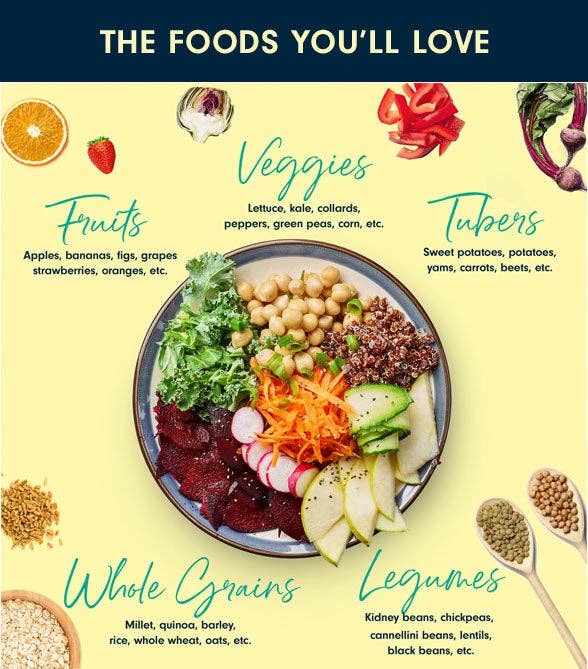How to Maintain a Well-Balanced Plant-Based Diet?
Dec 12, 2024Explore a comprehensive guide to maintaining a well-balanced plant-based diet, including essential food groups, practical tips for beginners, and advice on addressing common nutritional deficiencies. Learn how to create nutritious meals and gradually transition to a plant-based lifestyle.
Maintaining a Well-Balanced Plant-Based Diet: A Comprehensive Guide.
This article synthesizes information from several reputable sources to provide a comprehensive guide on maintaining a well-balanced plant-based diet. We'll explore the nuances of plant-based eating, addressing common misconceptions and offering practical advice for beginners and experienced plant-based eaters alike.
Understanding Plant-Based Diets
The term "plant-based" encompasses a spectrum of dietary approaches. It's not strictly defined, unlike "vegan" (completely excluding animal products) or "vegetarian" (excluding meat but potentially including dairy and eggs). A plant-based diet emphasizes whole, unprocessed plant foods, but the degree to which animal products are included can vary greatly. Some individuals may consume small amounts of meat, dairy, or eggs occasionally, while others may follow a completely vegan lifestyle.
:max_bytes(150000):strip_icc():format(webp)/4565089-13d53eaaf57f47869c5fe402a9b3e492.jpg)
Key Food Groups for a Balanced Plant-Based Diet
Regardless of your chosen level of plant-based eating, certain food groups are crucial for a well-balanced diet:
- Legumes (beans, lentils, chickpeas, peas): Excellent sources of plant-based protein and essential amino acids.
- Leafy green and cruciferous vegetables: Provide essential vitamins, minerals, and fiber.
- Nuts and seeds: Offer healthy fats, protein, and fiber.
- Whole grains: Supply complex carbohydrates, fiber, and some essential nutrients.
- Fruits and vegetables (variety is key): Ensure a wide range of vitamins, minerals, and phytonutrients.

Foods to Minimize or Avoid
While flexibility is a hallmark of plant-based eating, it's important to be mindful of the quality of the foods you consume. To maintain a healthy and balanced diet, minimize or avoid:
- Ultra-processed foods: These often lack nutritional value and can contribute to weight gain and health problems.
- Refined grains: White bread, white rice, and other refined grains are low in fiber and nutrients.
- Added sugars and sweeteners: Limit sugary drinks, desserts, and processed foods high in added sugar.
- Unhealthy fats: Minimize saturated and trans fats found in many processed foods and animal products.
Sample Meal Plan
A sample one-day menu from EatingWell illustrates a balanced approach:
- Breakfast: Chocolate-Banana Protein Smoothie (using non-dairy milk)
- Morning Snack: Apple and almond butter
- Lunch: Roasted Veggie & Tofu Brown Rice Bowl
- Afternoon Snack: Hummus and chopped raw vegetables
- Dinner: One-Pot Tomato Basil Pasta and a small side salad
- Evening Snack: No-Bake Vegan Date Brownies
:max_bytes(150000):strip_icc():format(webp)/4703579-a497a12b25b44cb8a92eef9737c2f18c.jpg)
Addressing Nutritional Deficiencies
Depending on the strictness of your plant-based approach, you may need to supplement certain nutrients. Vegans, in particular, are at higher risk of deficiencies in:
- Vitamin B12: Essential for nerve function and red blood cell production. Supplementation is often recommended.
- Calcium: Crucial for bone health. Good sources include leafy greens, fortified plant milks, and tofu.
- Iron: Important for oxygen transport. Pair iron-rich plant foods (legumes, spinach) with vitamin C to enhance absorption.
- Zinc: Essential for immune function and wound healing. Good sources include legumes, nuts, and seeds.
- Omega-3 fatty acids: Important for heart health and brain function. Flaxseeds, chia seeds, and walnuts are good plant-based sources.
- Vitamin D: Crucial for bone health and immune function. Supplementation or sun exposure may be necessary.
Gradual Transition
For those new to plant-based eating, a gradual transition is often recommended. Start by incorporating more plant-based meals into your week and gradually reducing your intake of animal products. Focus on adding nutrient-rich plant foods rather than solely restricting animal products.
Jan 21, 2025
Explore the pros and cons of a plant-based diet, including health benefits, potential challenges, and tips for successful implementation. Learn about vegetarian, vegan, and flexitarian approaches.
Jan 20, 2025
Explore the latest research on plant-based diets and their powerful health benefits, including disease prevention, heart health, diabetes management, and cancer risk reduction.
Jan 16, 2025
Explore the nutritional landscape of processed fake meat, comparing them to traditional meat and whole plant foods. Learn about ingredients, health impacts, and making informed choices.